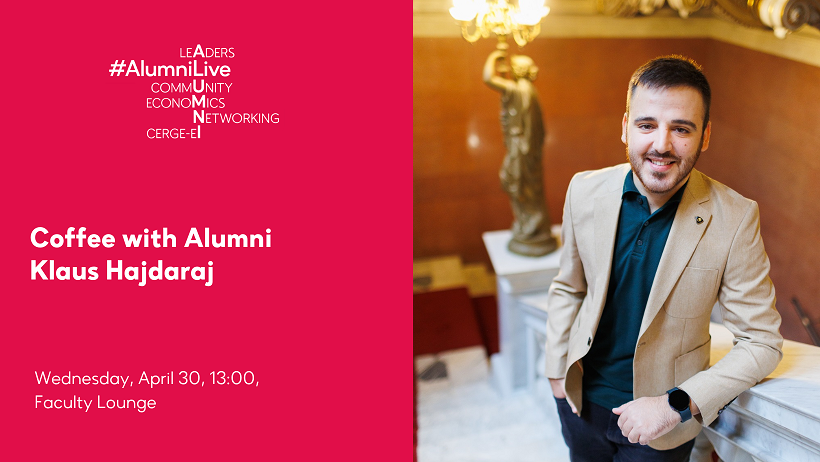Daily Events
13:00 | Special Event
Coffee with Alumni - Klaus Hajdaraj
We are pleased to invite CERGE-EI students, faculty, and alumni to the #AlumniLive coffee break with our alumnus, Klaus Hajdaraj, Data Scientist at MSD.
The coffee break will take place in the Faculty lounge on the 3rd floor. Grab your mugs and enjoy coffee, sweets, and networking!
#AlumniLive Coffee with Alumni is an informal gathering that allows students to network with alumni.

13:00 | Room 402 | Brown Bag Seminar | ONLINE
Nino Shoshiashvili: "Marriage Market Considerations in Educational Decisions"
You can join the seminar in person at the following address:
CERGE-EI, Politických vězňů 7, Praha 1, room 402
or online at: https://cerge-ei.webex.com/cerge-ei/j.php?MTID=m4c09ba9a374fff20c1edfcbef0d7f174
Meeting number: 2744 087 5025
Meeting password: 455862
Presenter: Nino Shoshiashvili (
Title: "Marriage Market Considerations in Educational Decisions"
Abstract:
The paper examines whether knowledge of marriage market returns affects study choices. We provided information intervention in Georgian schools regarding both the marriage market and the labour market to elicit beliefs about educational decisions. We find that students hold inaccurate beliefs regarding earnings, unemployment, and educational homogamy. The findings demonstrate that information strongly influences educational choices: in the Labor treatment group, 16% more students chose a different college major compared to the control group. In the Labor and Marriage treatment group, 25% more students switched their college major after receiving the information, indicating that the additional marriage-related information had a 9% effect. This difference between the two treatment groups is statistically significant at the 95% confidence interval. Notably, in the Labor treatment group, there is no difference in the likelihood of switching between males and females. However, in the Labor and Marriage treatment group, males are 24% less likely to switch than females. The data also show that these major switches predominantly shift toward STEM fields and are driven by students in the top 10% of their class.









